Students must practice these Maths 2B Important Questions TS Inter Second Year Maths 2B Circles Important Questions Short Answer Type to help strengthen their preparations for exams.
TS Inter Second Year Maths 2B Circles Important Questions Short Answer Type
Question 1.
If a point P is moving such that the lengths of tangents drawn from P to the circles x2 + y2 – 4x – 6y – 12 = 0 and x2 + y2 + 6x + 18y + 26 = 0 are in the ratio 2 : 3, then find the equation of the locus of P. [(AP) Mar. ’19, (TS) ’17]
Solution:
Let P(x1, y1) be a point on the locus and S = x2 + y2 – 4x – 6y – 12 = 0
S’ = x2 + y2 + 6x + 18y + 26 = 0 be the given circles.
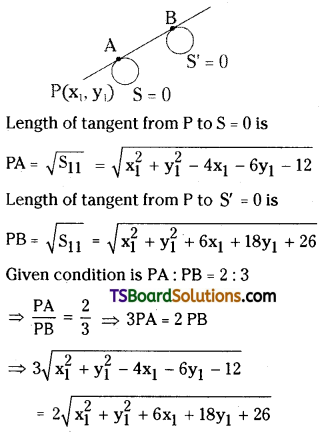
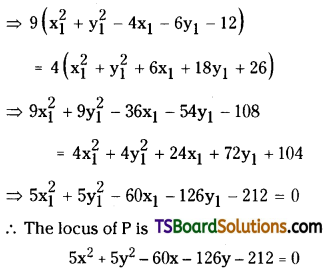
Question 2.
If a point P is moving such that the lengths of tangents drawn from P to x2 + y2 – 2x + 4y – 20 = 0 and x2 + y2 – 2x – 8y + 1 = 0 are in the ratio 2 : 1, then show that the equation of locus of P is x2 + y2 – 2x – 12y + 8 = 0.
Solution:
Let P(x, y) be a point on the locus and
S = x2 + y2 – 2x + 4y – 20 = 0
S’ = x2 + y2 – 2x – 8y + 1 = 0 be the given circles.
Length of tangent from P to S = 0 is
PA = \(\sqrt{S_{11}}=\sqrt{x^2+y^2-2 x+4 y-20}\)
Length of tangent from P to S’ = 0 is
PB = \(\sqrt{\mathrm{S}_{11}^{\prime}}=\sqrt{\mathrm{x}^2+\mathrm{y}^2-2 \mathrm{x}-8 \mathrm{y}+1}\)
Given condition is PA : PB = 2 : 1
\(\frac{\mathrm{PA}}{\mathrm{PB}}=\frac{2}{1}\)
⇒ PA = 2PB
⇒ \(\sqrt{x^2+y^2-2 x+4 y-20}\) = \(2 \sqrt{x^2+y^2-2 x-8 y+1}\)
squaring on both sides
⇒ x2 + y2 – 2x + 4y – 20 = 4(x2 + y2 – 2x – 8y + 1)
⇒ x2 + y2 – 2x + 4y – 20 – 4x2 – 4y2 + 8x + 32y – 4 = 0
⇒ -3x2 – 3y2 + 6x + 36y – 24 = 0
⇒ x2 + y2 – 2x – 12y + 8 = 0
The equation of locus of P is x2 + y2 – 2x – 12y + 8 = 0.
![]()
Question 3.
Find the equations of the tangent to the circle x2 + y2 – 4x + 6y – 12 = 0 which are parallel to x + y – 8 = 0. (Mar. ’01)
Solution:
Given equation of the circle is x2 + y2 – 4x + 6y – 12 = 0
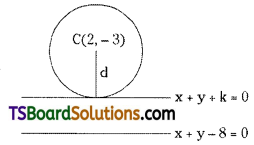
Comparing the given equation with x2 + y2 + 2gx + 2fy + c = 0,
we get g = -2, f = 3, c = -12
Centre C = (-g, -f) = (2, -3)
Radius r = \(\sqrt{g^2+\mathrm{f}^2-\mathrm{c}}=\sqrt{4+9+12}\) = 5
Given equation of the straight line is x + y – 8 = 0
The equation of the tangent parallel to x + y – 8 = 0 is
x + y + k = 0 ……….(1)
Since eq. (1) is a tangent to the given circle then r = d.
r = \(\frac{\left|a x_1+b y_1+c\right|}{\sqrt{a^2+b^2}}\)
⇒ 5 = \(\frac{|1(2)+1(-3)+\mathbf{k}|}{\sqrt{(1)^2+(1)^2}}\)
⇒ 5 = \(\frac{|2-3+\mathbf{k}|}{\sqrt{2}}\)
⇒ 5√2 = |k – 1|
⇒ k – 1 = ±5√2
⇒ k = 1 ± 5√2
Substitute the value of ‘k’ in eq. (1)
x + y + 1 ± 5√2 = 0
Question 4.
Show that x + y + 1 = 0 touches the circle x2 + y2 – 3x + 7y + 14 = 0 and find its point of contact.
Solution:
Given equation of the circle is x2 + y2 – 3x + 7y + 14 = 0
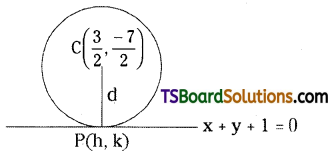
Comparing the given equation with x2 + y2 + 2gx + 2fy + c = 0, we get
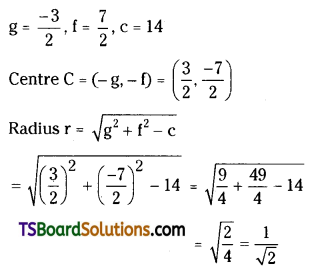
Given the equation of the line is x + y + 1 = 0.
Now, d = The perpendicular distance from the centre C\(\left(\frac{3}{2}, \frac{-7}{2}\right)\) to the line x + y + 1 = 0.
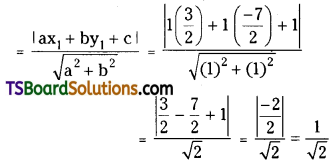
Since r = d then, the line x + y + 1 = 0 touches the circle x2 + y2 – 3x + 7y + 14 = 0.
Let P(h, k) be the point of contact.
Now, P(h, k) is the foot of the perpendicular drawn from C = \(\left(\frac{3}{2}, \frac{-7}{2}\right)\) to the line x + y + 1 = 0
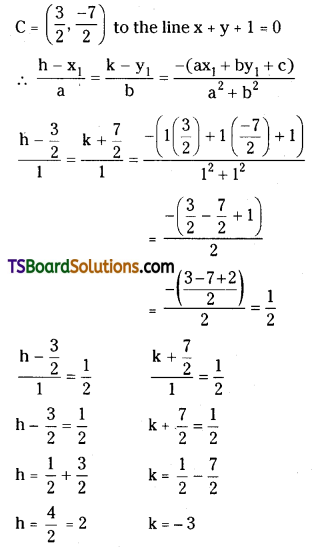
∴ The point of contact is P(2, -3).
Question 5.
Show that the points (1, 1), (-6, 0), (-2, 2), and (-2, -8) are concyclic and find the equation of the circle on which they lie. [(AP) Mar. ’19; May ’17]
Solution:
Let, the equation of the required circle is
x2 + y2 + 2gx + 2fy + c = 0 …….(1)
Since, (1) passes through point (1, 1)
12 + 12 + 2g(1) + 2f(1) + c = 0
2 + 2g + 2f + c = 0
2g + 2f + c = -2 ……(2)
Since, (1) passes through the point (-6, 0)
(-6)2 + 02 + 2g(-6) + 0 + c = 0
36 + c – 12g = 0
-12g + c = -36 …….(3)
Since, (1) passes through the point (-2, 2)
(-2)2 + (2)2 + 2g(-2) + 2f(2) + c = 0
4 + 4 – 4g + 4f + c = 0
-4g + 4f + c = -8 ……..(4)
From (2) and (3)
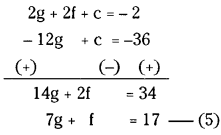
From (3) and (4)
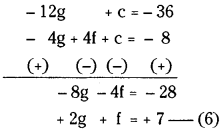
Solving (5) and (6)
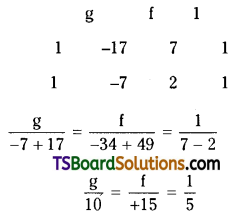
g = 2, f = 3
Substitute the values of g, f in (2)
2(2) + 2(3) + c = -2
4 + 6 + c = -2
10 + c = -2
c = -12
Now, substitute the values of g, f, c in (1)
∴ The equation of the required circle is
x2 + y2 + 2(2) x + 2(3) y – 12 = 0
x2 + y2 + 4x + 6y – 12 = 0 ………(7)
Now, substituting the point (-2, -8) in (7)
(-2)2 + (-8)2 + 4(-2) + 6(-8) – 12 = 0
4 + 64 – 8 – 48 – 12 = 0
68 – 68 = 0
0 = 0
∴ Given points are concyclic.
∴ Required equation of the circle is x2 + y2 + 4x + 6y – 12 = 0
![]()
Question 6.
Find the equations of the tangents to the circle x2 + y2 + 2x – 2y – 3 = 0 which are perpendicular to 3x – y + 4 = 0.
Solution:
Given equation of the circle is x2 + y2 + 2x – 2y – 3 = 0
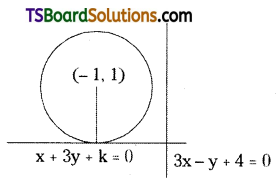
Comparing this equation with x2 + y2 + 2gx + 2fy + c = 0
we get g = 1, f = -1, c = -3,
Centre of the circle C(-g, -f) = (-1, 1)
The radius of the circle
r = \(\sqrt{\mathrm{g}^2+\mathrm{f}^2-\mathrm{c}}\)
= \(\sqrt{(-1)^2+(1)^2+3}\)
= √5
Given the equation of the straight line is 3x – y + 4 = 0
The equation of the straight line perpendicular to 3x – y + 4 = 0 is
x + 3y + k = 0 ……..(1)
Since (1) is the tangent to the given circle then r = d
√5 = \(\frac{\left|a x_1+b y_1+c\right|}{\sqrt{a^2+b^2}}\)
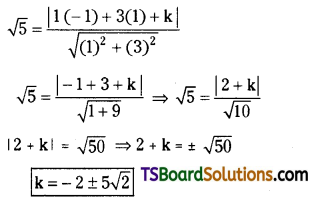
The equations of the tangents are from (1),
x + 3y – 2 ± 5√2 = 0
Question 7.
Show that the tangent at (-1, 2) of the circle x2 + y2 – 4x – 8y + 7 = 0 touches the circle x2 + y2 + 4x + 6y = 0 and finds its point of contact. (May ’10)
Solution:
Given equation of the circle is x2 + y2 – 4x – 8y + 7 = 0
Comparing the given equation with x2 + y2 + 2gx + 2fy + c = 0
we get g = -2, f = -4, c = 7
Let the given point P(x1, y1) = (-1, 2)
The equation of the tangent is S1 = 0
⇒ xx1 + yy1 + g(x + x1) + f(y + y1) + c = 0
⇒ x(-1) + y(2) – 2(x – 1) – 4(y + 2) + 7 = 0
⇒ -x + 2y – 2x + 2 – 4y – 8 + 7 = 0
⇒ -3x – 2y + 1 = 0
⇒ 3x + 2y – 1 = 0
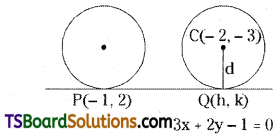
Given equation of the circle is x2 + y2 + 4x + 6y = 0
Comparing the given equation with x2 + y2 + 2gx + 2fy + c = 0,
we get g = 2, f = 3, c = 0
Centre C(-g, -f) = (-2, -3)
Radius r = \(\sqrt{g^2+f^2-c}\)
= \(\sqrt{4+9}\)
= √13
Now d = The perpendicular distance from the centre C = (-2, -3) to the line 3x + 2y – 1 = 0
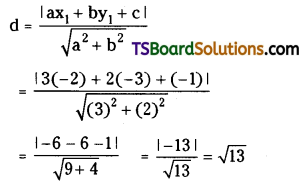
Since r = d, the tangent at (-1, 2) of the circle x2 + y2 – 4x – 8y + 7 = 0 touches the circle x2 + y2 + 4x + 6y = 0.
Let Q(h, k) be the point of contact.
Now, Q(h, k) is the foot of the perpendicular drawn from centre C(-2, -3) to the line 3x + 2y – 1 = 0.
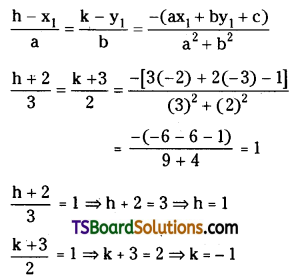
∴ The point of contact Q(h, k) = (1, -1).
Question 8.
Find the angle between the tangents drawn from (3, 2) to the circle x2 + y2 – 6x + 4y – 2 = 0. (Mar. ’12)
Solution:
Given the equation of the circle is x2 + y2 – 6x + 4y – 2 = 0.
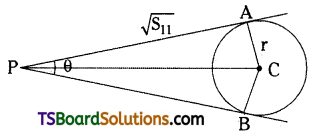
Comparing the given equation with x2 + y2 + 2gx + 2fy + c = 0,
we get g = -3, f = 2, c = -2
Radius r = \(\sqrt{9+4+2}=\sqrt{15}\)
Let the given point P(x1, y1) = (3, 2)
Length of the tangent = \(\sqrt{\mathrm{S}_{11}}\)
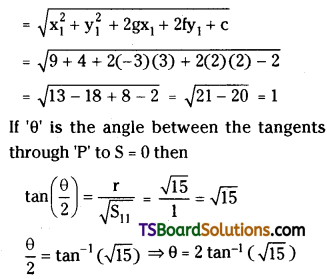
![]()
Question 9.
Find the locus of ‘P’ where the tangent is drawn from ‘P’ to x2 + y2 = a2 are perpendicular to each other.
Solution:
Given the equation of the circle is x2 + y2 = a2
Radius r = a
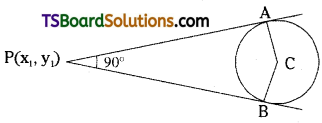
Let P(x1, y1) be any point on the locus.
Length of the tangent = \(\sqrt{\mathrm{S}_{11}}\) = \(\sqrt{\mathrm{x}_1^2+\mathrm{y}_1^2-\mathrm{a}^2}\)
Given that angle between the tangents θ = 90°
If ‘θ’ is the angle between the tangents through ‘P’ to the given circle then
\(\tan \left(\frac{\theta}{2}\right)=\frac{r}{\sqrt{S_{11}}}\)
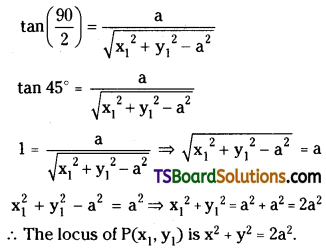
Question 10.
Find the chord length intercepted by the circle x2 + y2 – 8x – 2y – 8 = 0 on the line x + y + 1 = 0. [(TS) Mar. ’16]
Solution:
Given equation of the circle is x2 + y2 – 8x – 2y – 8 = 0
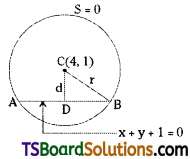
Comparing the given equation with x2 + y2 + 2gx + 2fy + c = 0,
we get g = -4, f = -1, c = -8
Centre of the circle C = (-g, -f) = (4, 1)
Radius r =\(\sqrt{\mathrm{g}^2+\mathrm{f}^2-\mathrm{c}}\)
= \(\sqrt{(-4)^2+(-1)^2+8}\)
= 5
Given equation of the straight line is x + y + 1 = 0
Now d = perpendicular distance from the centre C(4, 1) to the chord x + y + 1 = 0
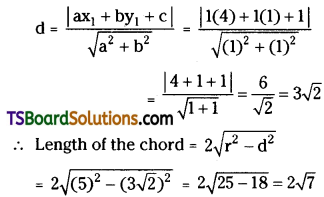
Question 11.
Find the chord length intercepted by the circle x2 + y2 – x + 3y – 22 = 0 on the line y = x – 3. [(TS) Mar. ’20; (AP) Mar. ’18, May ’16, Mar. ’13]
Solution:
Given equation of the circle is x2 + y2 – x + 3y – 22 = 0
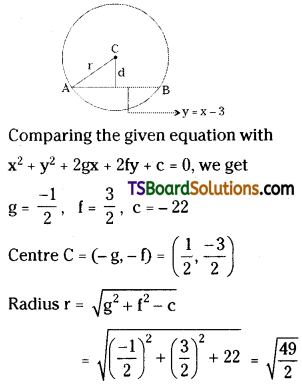
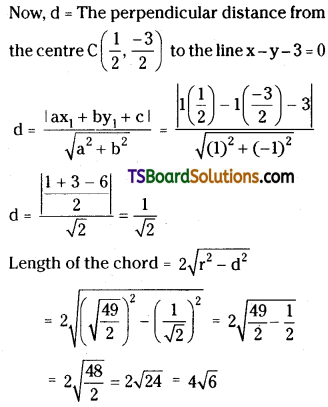
Question 12.
Find die length of the chord formed by x2 + y2 = a2 on the line x cos α + y sin α = P. [(TS) Mar. ’16]
Solution:
Given equation of the circle is x2 + y2 – a2 = 0
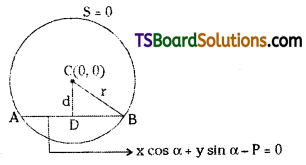
Comparing this equation with x2 + y2 + 2gx + 2fy + c = 0
We get g = 0, f = 0, c = -a2
Centre of the circle C(-g, -f) = (0, 0)
Radius of the circle r = \(\sqrt{g^2+f^2-c}\)
= \(\sqrt{(0)^2+(0)^2+a^2}\)
= a
Given the equation of the straight line is x cos α + y sin α – P = 0
Now d = perpendicular distance from the centre C(0,0) to the chord x cos α + y sin α – P = 0
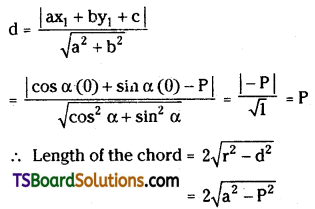
Question 13.
Find the equation of the circle with centre (-2, 3) cutting a chord length 2 units on 3x + 4y + 4 = 0. (Mar. ’11)
Solution:
Given that centre C(h, k) = (-2, 3)
Given the equation of the straight line is 3x + 4y + 4 = 0
Now d = The perpendicular distance from the centre C(-2, 3) to the line 3x + 4y + 4 = 0.
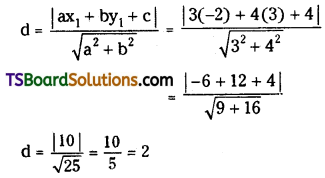
Given that the length of the chord = 2
\(2 \sqrt{\mathrm{r}^2-\mathrm{d}^2}\) = 2
⇒ \(\sqrt{\mathrm{r}^2-\mathrm{d}^2}\) = 1
⇒ r2 – d2 = 1
⇒ r2 – 22 = 1
⇒ r2 – 4 = 1
⇒ r2 = 5
⇒ r = √5
The equation of the required circle is (x – h)2 + (y – k)2 = r2
⇒ (x + 2)2 + (y- 3)2 = (√5)2
⇒ x2 + 4 + 4x + y2 + 9 – 6y = 5
⇒ x2 + y2 + 4x – 6y + 8 = 0
![]()
Question 14.
Find the area of the triangle formed by the normal at (3, -4) to the circle x2 + y2 – 22x – 4y + 25 = 0 with the coordinate axis. [Mar. ’18 (TS)]
Solution:
Given circle is x2 + y2 – 22x – 4y + 25 = 0
Compare with x2 + y2 + 2gx + 2fy + c = 0 then
we get 2g = -22 ⇒ g = -11
2f = -4 ⇒ f = -2, c = 25
centre c(-g, -f) = c(11, 2)
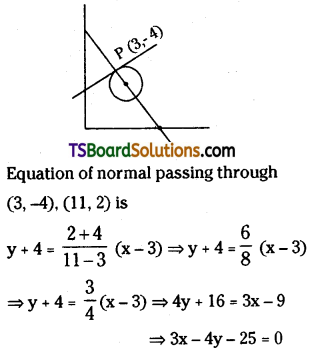
The area of the triangle formed by the normal with the coordinate axis = \(\frac{c^2}{2|a b|}\)
= \(\frac{(-25)^2}{2|3(-4)|}\)
= \(\frac{625}{24}\) sq units
Question 15.
Find the mid point of the chord intercepted by x2 + y2 – 2x – 10y + 1 = 0 on the line x – 2y + 7 = 0.
Solution:
Given equation of the circle is x2 + y2 – 2x – 10y + 1 = 0
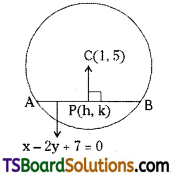
Comparing the given equation with x2 + y2 + 2gx + 2fy + c = 0
we get, g = -1, f = -5, c = 1
Centre of the circle, C = (-g, -f) = (1, 5)
Given equation of the straight line is x – 2y + 7 = 0
Comparing this equation with ax + by + c = 0,
we get a = 1, b = -2, c = 7
Let P(h, k) is the midpoint of the chord x – 2y + 7 = 0
Now P(h, k) is the foot of the perpendicular from centre C(1, 5) on the chord x – 2y + 7 = 0
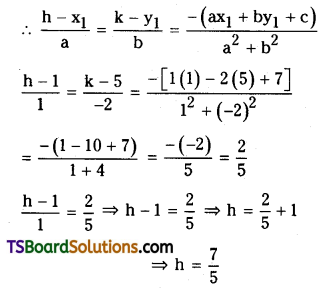
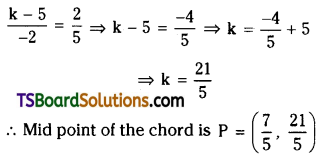
Question 16.
Show that the area of the triangle formed by the two tangents through P(x1, y1) to the circle S = x2 + y2 + 2gx + 2fy + c = 0 and the chord of contact of ‘P’ with respect to S = 0 is \(\frac{\mathbf{r}\left(\mathbf{S}_{11}\right)^{3 / 2}}{\mathbf{S}_{11}+\mathbf{r}^2}\), where ‘r’ is the radius of the circle.
Solution:
If θ is the angle between the tangents ‘P’ to S = 0, then
\(\tan \left(\frac{\theta}{2}\right)=\frac{r}{\sqrt{S_{11}}}\)
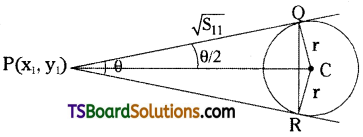
Let Q, R be the chord of the contact from ‘P’ to the circle.
Let PA be the ⊥r from P to QR.
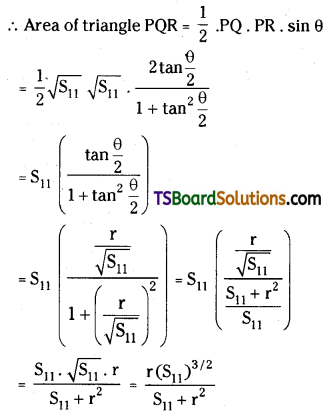
Question 17.
Find the pole of the line x + y + 2 = 0 w.r.t the circle x2 + y2 – 4x + 6y – 12 = 0. [(AP) Mar. ’17, May ’15]
Solution:
Given equation of the circle x2 + y2 – 4x + 6y – 12 = 0
Comparing this equation with x2 + y2 + 2gx + 2fy + c = 0
We get g = -2, f = 3, c = -12
Radius r = \(\sqrt{g^2+f^2-c}\)
= \(\sqrt{4+9+12}\)
= 5
Given equation of the straight line is x + y + 2 = 0
Comparing this equation with lx + my + n = 0,
we get l = 1, m = 1, n = 2
The pole of lx + my + n = 0 w.r.t x2 + y2 + 2gx + 2fy + c = 0 is
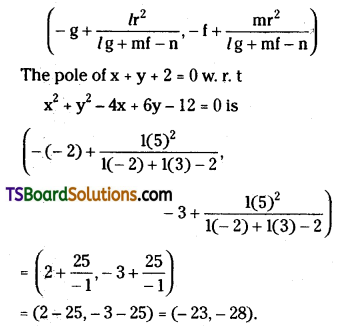
Question 18.
Find the pole of the line 3x + 4y – 45 = 0 w.r.t the circle x2 + y2 – 6x – 8y + 5 = 0. [(AP) Mar. ’16]
Solution:
Given equation of the circle x2 + y2 – 6x – 8y + 5 = 0
Comparing this equation with x2 + y2 + 2gx + 2fy + c = 0
We get g = -3, f = -4, c = 5
Radius r = \(\sqrt{\mathrm{g}^2+\mathrm{f}^2-\mathrm{c}}\)
= \(\sqrt{9+16-5}\)
= √20
Given the equation of the straight line is 3x + 4y – 45 = 0
Comparing the given equation with lx + my + n = 0,
we get l = 3, m = 4, n = -45
The pole of lx + my + n = 0 w.r.t x2 + y2 + 2gx + 2fy + c = 0 is
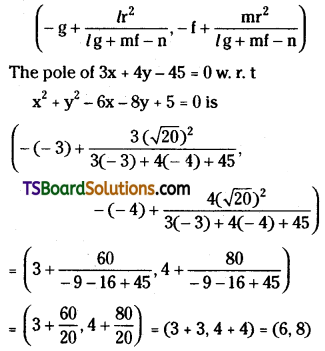
Question 19.
Show that the lines 2x + 3y + 11 = 0, 2x – 2y – 1 = 0 are conjugate w.r.t the circle x2 + y2 + 4x + 6y + 12 = 0.
Solution:
Given equation of the circle x2 + y2 + 4x + 6y + 12 = 0
Comparing this equation with x2 + y2 + 2gx + 2fy + c = 0
We get g = 2, f = 3, c = 12
Radius r = \(\sqrt{g^2+f^2-c}\)
= \(\sqrt{4+9-12}\)
= 1
Given equations of the straight lines are
2x + 3y + 11 = 0 …….(1)
2x – 2y – 1 = 0 ………(2)
Comparing (1) with l1x + m1y + n1 = 0
we get l1 = 2, m1 = 3, n1 = 11
Comparing (2) with l2x + m2y + n2 = 0
we get l2 = 2, m2 = -2, n2 = -1
Now (l1g + m1f – n1) (l2g + m2f – n2)
= [2(2) + 3(3) – 11] [2(2) + 3(-2) + 1]
= (4 + 9 – 11) (4 – 6 + 1)
= 2(-1)
= -2
r2 (l1l2 + m1m2) = (1)2 [2(2) + 3(-2)]
= 1(4 – 6)
= -2
∴ (l1g + m1f – n1) (l2g + m2f – n2) = r2 (l1l2 + m1m2)
∴ Given lines are conjugate w.r.t given circle.
![]()
Question 20.
Find the value of ‘k’ if x + y – 5 = 0 and 2x + ky – 8 = 0 are conjugate with respect to the circle x2 + y2 – 2x – 2y – 1 = 0. [(TS) May ’18]
Solution:
Given equation of the circle is x2 + y2 – 2x – 2y – 1 = 0
Comparing this equation with x2 + y2 + 2gx + 2fy + c = 0
We get g = -1, f = -1, c = -1
Radius r = \(\sqrt{\mathrm{g}^2+\mathrm{f}^2-\mathrm{c}}\)
= \(\sqrt{1+1+1}\)
= √3
Given equations of the straight lines are
x + y – 5 = 0 ………(1)
2x + ky – 8 = 0 ……..(2)
Comparing (1) with l1x + m1y + n1 = 0
we get l1 = 1, m1 = 1, n1 = -5
Comparing (2) with l2x + m2y + n2 = 0
we get l2 = 2, m2 = k, n2 = -8
Since given lines are conjugate w.r.t given circle, then
(l1g + m1f – n1) (l2g + m2f – n2) = r2 (l1l2 + m1m2)
⇒ [1(-1) + 1(-1) + 5] [2(-1) + k(-1) + 8] = (√3)2 [1(2) + 1(k)]
⇒ (-1 – 1 + 5)(-2 – k + 8) = 3(2 + k)
⇒ 3(-k + 6) = 3(k + 2)
⇒ -k + 6 = k + 2
⇒ 2k = 4
⇒ k = 2
Question 21.
Find the condition that the tangents drawn from (0, 0) to S = x2 + y2 + 2gx + 2fy + c = 0 be perpendicular to each other. [(TS) May ’16]
Solution:
Given equation of the circle is S = x2 + y2 + 2gx + 2fy + c = 0
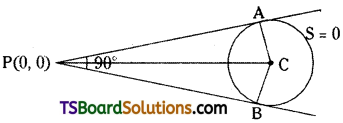
Centre, C = (-g, -f)
Radius, r = \(\sqrt{\mathrm{g}^2+\mathrm{f}^2-\mathrm{c}}\)
Let, the given point P(x1, y1) = (0, 0)
The angle between the tangents, θ = 90°
The length of the tangent = \(\sqrt{\mathrm{S}_{11}}\)
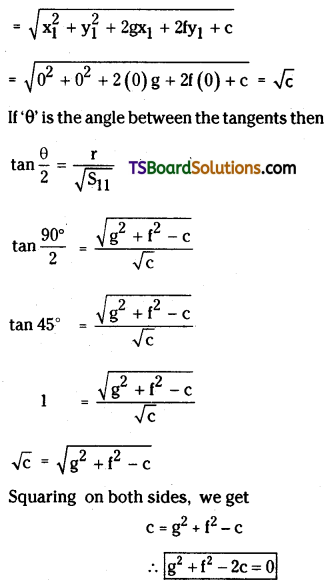
Question 22.
If the abscissae of points A, B are the roots of the equation x2 + 2ax – b2 = 0 and ordinates of A, B are roots of y2 + 2py – q2 = 0, then find the equation of a circle for which \(\overline{\mathbf{A B}}\) is a diameter. (Mar. ’14)
Solution:
Let A (x1, y1)( B (x2, y2) are the two given points.
Since x1, x2 are the roots of the quadratic equation x2 + 2ax – b2 = 0 then
sum of the roots = \(\frac{-b}{a}\)
x1 + x2 = \(\frac{-2 \mathrm{a}}{1}\) = -2a
Product of the roots = \(\frac{c}{a}\)
x1x2 = \(\frac{-b^2}{1}\) = -b2
Since y1, y2 are the roots of the quadratic equation y2 + 2py – q2 = 0 then
sum of the roots = \(\frac{-b}{a}\)
y1 + y2 = \(\frac{-2 p}{1}\) = -2p
Product of the roots = \(\frac{c}{a}\)
y1y2 = \(\frac{-\mathrm{q}^2}{1}\) = -q2
The equation of a circle for which \(\overline{\mathbf{A B}}\) is a diameter is
(x – x1)(x – x2) + (y – y1)(y – y2) = 0
⇒ x2 – xx2 – xx1 + x1x2 + y2 – yy1 – yy2 + y1y2 = 0
⇒ x2 – x(x1 + x2) + x1x2 + y2 – y(y1 + y2) + y1y2 = 0
⇒ x2 – x(-2a) + (-b2) + y2 – y(-2p) + (-q2) = 0
⇒ x2 + y2 + 2ax + 2py – b2 – q2 = 0
![]()
Question 23.
Find the equation of the circle which touches the x-axis at a distance of 3 from the origin and make an intercept of length 6 on the y-axis.
Solution:
Let the equation of the required circle is
x2 + y2 + 2gx + 2fy + c = 0 ………(1)
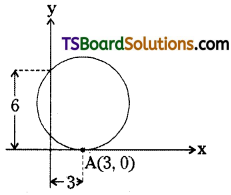
Since (1) meets the x-axis at A(3, 0)
∴ Point A(3, 0) lies on the circle (1), then
(3)2 + (0)2 + 2g(3) + 2f(0) + c = 0
⇒ 9 + 6g + c = 0
⇒ 6g + c = -9 ……..(2)
Since, the circle (1) touches the x-axis, then
g2 = c …….(3)
From (2) and (3)
6g + g2 = – 9
⇒ g2 + 6g + 9 = 0
⇒ (g + 3)2 = 0
⇒ g + 3 = 0
⇒ g = -3
Now, substitute the value of g in (3), and we get
(-3)2 = c
⇒ c = 9
Given that the intercept on the y-axis made by (1) is 6
\(2 \sqrt{f^2-c}\) = 6
⇒ \(\sqrt{\mathrm{f}^2-\mathrm{c}}\) = 3
⇒ \(\sqrt{\mathrm{f}^2-9}\) = 3
⇒ f2 – 9 = 9
⇒ f2 = 18
⇒ f = ±3√2
Substitute the values of g, f, c in (1)
∴ The required equation of the circle is x2 + y2 + 2(-3)x + 2(±3√2)y + 9 = 0
⇒ x2 + y2 – 6x ± 6√2y + 9 = 0
Question 24.
Find the equation of the circle passing through (0, 0) and making intercepts 4, 3 on the x, y-axis respectively.
Solution:
Let the equation of the required circle is
x2 + y2 + 2gx + 2fy + c = 0 ………(1)
Since (1) passes through the point (0, 0), then
(0)2 + (0)2 + 2g(0) + 2f(0) + c = 0
∴ c = 0
Given that the intercept on the x-axis made by (1) = 4
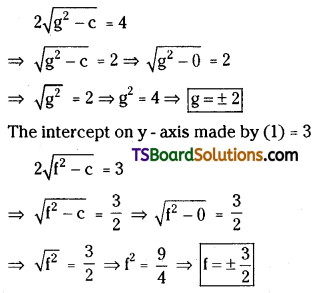
Now, substitute the values of g, f, c in (1)
The equation of the required circle is
x2 + y2 + 2(±2)x + 2(±\(\frac{3}{2}\))y + 0 = 0
⇒ x2 + y2 ± 4x ± 3y = 0
Question 25.
Show that the locus of the point of intersection of the lines x cos α + y sin α = a, x sin α – y cos α = b (α is a parameter) is a circle.
Solution:
Given equations of the straight lines are
x cos α + y sin α = a …….(1)
x sin α – y cos α = b …….(2)
Now (1)2 + (2)2
⇒ (x cos α + y sin α)2 + (x sin α – y cos α)2 = a2 + b2
⇒ x2 cos2α + y2 sin2α + 2xy sin α cos α + x2 sin2α + y2 cos2α – 2xy sin α cos α = a2 + b2
⇒ x2 (cos2α + sin2α) + y2 (sin2α + cos2α) = a2 + b2
⇒ x2 (1) + y2 (1) = a2 + b2
∴ x2 + y2 = a2 + b2
∴ The locus of the point of intersection of the given line is x2 + y2 = a2 + b2
It represents a circle.
Question 26.
If y = mx + c and x2 + y2 = a2
(i) Intersect at A and B
(ii) AB = 2λ, then show that c2 = (1 + m2) (a2 – λ2)
Solution:
Given the equation of the circle is x2 + y2 = a2
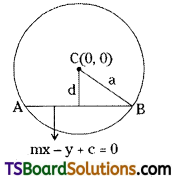
Comparing this equation with x2 + y2 = r2, then centre of the circle C = (0, 0)
The radius of the circle r = a
Given the equation of the straight line is mx – y + c = 0
Now, d = the perpendicular distance from the centre C(0, 0) to the line mx – y + c = 0
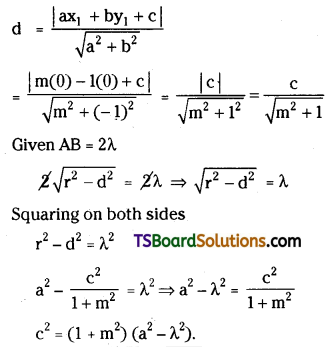
Question 27.
Find the equation of the circle with centre (2, 3) and touch the line 3x – 4y + 1 = 0.
Solution:
Given, centre C(h, k) = (2, 3)
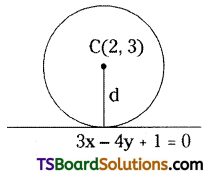
Given the equation of the straight line is 3x – 4y + 1 = 0
Since, the line 3x – 4y + 1 = 0 touches the required circle, then the line 3x – 4y + 1 = 0 is a tangent to the required circle.
∴ Radius r = The perpendicular distance from the centre C(2, 3) to the tangent 3x – 4y + 1 = 0
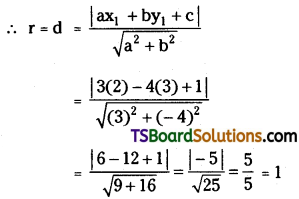
∴ The equation of the required circle is (x – h)2 + (y – k)2 = r2
⇒ (x – 2)2 + (y – 3)2 = (1)2
⇒ x2 + 4 – 4x + y2 + 9 – 6y = 1
⇒ x2 + y2 – 4x – 6y + 12 = 0
![]()
Question 28.
Find the equation of the tangent at the point 30° (parametric value of θ) of the circle x2 + y2 + 4x + 6y – 39 = 0.
Solution:
Given equation of the circle is x2 + y2 + 4x + 6y – 39 = 0
Comparing the given equation with x2 + y2 + 2gx + 2fy + c = 0
We get g = 2, f = 3, c = -39
Radius r = \(\sqrt{g^2+f^2-c}\)
= \(\sqrt{(2)^2+(3)^2+39}\)
= 2√13
The given point θ = 30°
∴ The equation of the tangent at the point θ of the given circle is (x + g) cos θ + (y + f) sin θ = r
⇒ (x + 2) cos 30° + (y + 3) sin 30° = 2√13
⇒ (x + 2) . \(\frac{\sqrt{3}}{2}\) + (y + 3) . \(\frac{1}{2}\) = 2√13
⇒ √3x + 2√3 + y + 3 = 4√13
⇒ √3x + y + 2√3 + 3 – 4√13 = 0
Question 29.
Find the equation of the tangent to x2 + y2 – 2x + 4y = 0 at (3, -1). Also, find the equation of tangent parallel to it. [(TS) May ’17]
Solution:
Given equation of the circle is x2 + y2 – 2x + 4y = 0
Comparing this equation with x2 + y2 + 2gx + 2fy + c = 0
we get g = -1, f = 2, c = 0
The given point P(x1, y1) = (3, -1)
∴ The equation of the tangent at P is S1 = 0
xx1 + yy1 + g(x + x1) + f(y + y1) + c = 0
⇒ x(3) + y(-1) – 1(x + 3) + 2(y – 1) + 0 = 0
⇒ 3x – y – x – 3 + 2y – 2 = 0
⇒ 2x + y – 5 = 0
Centre of the circle, C = (-g, -f) = (1, -2)
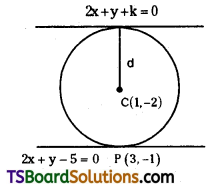
Radius of the circle, r = \(\sqrt{g^2+f^2-c}\)
= \(\sqrt{(-1)^2+(2)^2+0}\)
= √5
The equation of the straight line parallel to the tangent 2x + y – 5 = 0 is
2x + y + k = 0 …….(1)
If (1) is a tangent to the given circle when r = d
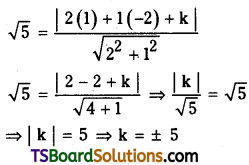
The equations of tangents to the circle are from (1)
2x + y ± 5 = 0
One of these equations namely 2x + y – 5 = 0 is the tangent at (3, -1).
The tangent parallel to 2x + y – 5 = 0 is 2x + y + 5 = 0.
Question 30.
If 4x – 3y + 7 = 0 is a tangent to the circle represented by x2 + y2 – 6x + 4y – 12 = 0 then find the point of contact.
Solution:
Given equation of the circle is x2 + y2 – 6x + 4y – 12 = 0
Comparing this equation with x2 + y2 + 2gx + 2fy + c = 0
we get, g = -3, f = 2, c = -12
Centre of the circle, C = (-g, -f) = (3, -2)
Given equation of the tangent is 4x – 3y + 7 = 0
Let the point of contact be P = (h, k)
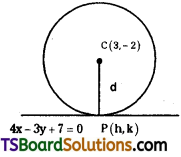
Now, P(h, k) is the foot of the perpendicular from the centre, C(3, -2) to the tangent 4x – 3y + 7 = 0
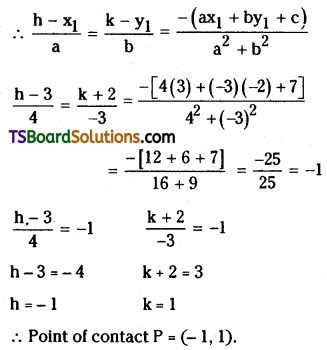
Question 31.
Find the equation of the normal to the circle x2 + y2 – 4x – 6y + 11 = 0 at (3, 2). Also, find the other point where the normal meets the circle.
Solution:
Given equation of the circle is x2 + y2 – 4x – 6y + 11 = 0
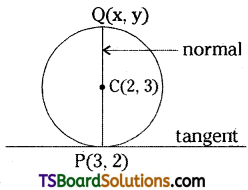
Comparing this equation with x2 + y2 + 2gx + 2fy + c = 0
We get g = -2, f = -3, c = 11
Given point P(x1, y1) = (3, 2)
Centre of the circle C(-g, -f) = (2, 3)
∴ The equation of the tangent at P is S1 = 0
⇒ xx1 + yy1 + g(x + x1) + f(y + y1) + c = 0
⇒ x(3) + y(2) + (- 2) (x + 3) – 3(y + 2) + 11 = 0
⇒ 3x + 2y – 2x – 6 – 3y – 6 + 11 = 0
⇒ x – y – 1 = 0
Slope of the tangent at P is m = \(\frac{-1}{-1}\) = 1
Slope of the normal at P is \(\frac{-1}{m}=\frac{-1}{1}\) = -1
∴ The equation of the normal at P is
y – y1 = \(\frac{-1}{m}\) (x – x1)
⇒ y – 2 = -1(x – 3)
⇒ y – 2 = -x + 3
⇒ x + y – 5 = 0
Other point of the normal Q = (x, y)
The centre of the circle is the midpoint of P and Q (point of intersection of normal and circle)
∴ C(2, 3) = Midpoint of PQ
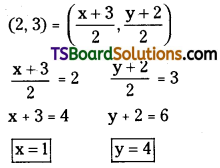
∴ The normal at (3, 2) meets the circle at (1, 4).
![]()
Question 32.
Find the equation of the normal to the circle x2 + y2 – 10x – 2y + 6 = 0 at (3, 5). Also, find the other point where the normal meets the circle.
Solution:
Given equation of the circle is x2 + y2 – 10x – 2y + 6 = 0
Comparing this equation with x2 + y2 + 2gx + 2fy + c = 0
We get g = -5, f = -1, c = 6
The given point P(x1, y1) = (3, 5)
∴ The equation of the tangent at P is S1 = 0
⇒ xx1 + yy1 + g(x + x1) + f(y + y1) + c = 0
⇒ x(3) + y(5) + (-5) (x + 3) + (-1) (y + 5) + 6 = 0
⇒ 3x + 5y – 5x – 15 – y – 5 + 6 = 0
⇒ -2x + 4y – 14 = 0
⇒ x – 2y + 7 = 0
The slope of the tangent at P is m = \(\frac{-\mathrm{a}}{\mathrm{b}}=\frac{-1}{-2}=\frac{1}{2}\)
The slope of the normal at P is \(\frac{-1}{\mathrm{~m}}=\frac{-1}{\frac{1}{2}}\) = -2
∴ The equation of the normal at P(3, 5) is
\(\mathrm{y}-\mathrm{y}_1=\frac{-1}{\mathrm{~m}}\left(\mathrm{x}-\mathrm{x}_1\right)\)
⇒ y – 5 = -2(x – 3)
⇒ y – 5 = -2x + 6
⇒ 2x + y – 1 = 0
Question 33.
Find the locus of P, where the tangents drawn from P to x2 + y2 = a2 include an angled α.
Solution:
Given the equation of the circle is x2 + y2 = a2
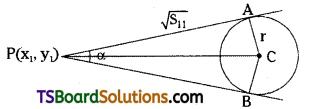
Comparing this equation with x2 + y2 = r2
We get r = a
Let P(x1, y1) be a point on the locus.
The length of the tangent = \(\sqrt{\mathrm{S}_{11}}\)
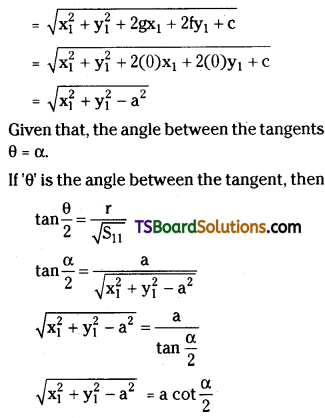
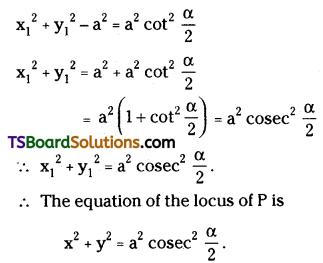
Question 34.
If ax + by + c = 0 is polar of (1, 1) w.r.t x2 + y2 – 2x + 2y + 1 = 0 and HCF of a, b, c is equal to one, then find a2 + b2 + c2.
Solution:
Given equation of the circle is x2 + y2 – 2x + 2y + 1 = 0
Comparing this equation with x2 + y2 + 2gx + 2fy + c = 0,
We get g = -1, f = 1, c = 1
Let, the given point P(x1, y1) = (1, 1)
The equation of polar of (1, 1) w.r. t to the given circle is S1 = 0
xx1 + yy1 + g(x + x1) + f(y + y1) + c = 0
⇒ x(1) + y(1) – 1(x + 1) + 1(y + 1) + 1 = 0
⇒ x + y – x – 1 + y + 1 + 1 = 0
⇒ 2y + 1 = 0
Given equation of the polar is ax + by + c = 0, then
a = 0, b = 2, c = 1
The H.C.F of a, b, c is equal to ‘1’.
Now a2 + b2 + c2 = (0)2 + (2)2 + (1)2
= 0 + 4 + 1
= 5
Question 35.
If the polar of the points on the circle x2 + y2 = a2 with respect to the circle x2 + y2 = b2 touches the circle x2 + y2 = c2, then prove that a, b, c are in Geometric Progression.
Solution:
Given the equation of the first circle is x2 + y2 = a2
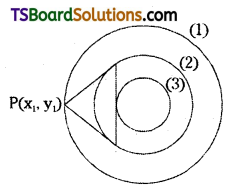
Let P(x1, y1) be any point on the circle x2 + y2 = a2, then
\(\mathrm{x}_1^2+\mathrm{y}_1^2=\mathrm{a}^2\) ……….(1)
The equation of the second circle is x2 + y2 = b2
The polar of P(x1, y1) w.r.t the second circle x2 + y2 = b2 is S1 = 0
xx1 + yy1 – b2 = 0 ……..(2)
The equation of the third circle is x2 + y2 = c2
Centre C = (0, 0); Radius r = c
Since (2) is a tangent to the circle x2 + y2 = c2 then r = d
c = \(\frac{\left|\mathrm{x}_1(0)+\mathrm{y}_1(0)-\mathrm{b}^2\right|}{\sqrt{\mathrm{x}_1^2+\mathrm{y}_1^2}}\)
⇒ c = \(\frac{\left|-b^2\right|}{\sqrt{a^2}}\)
⇒ c = \(\frac{\mathrm{b}^2}{\mathrm{a}}\)
⇒ b2 = ac
∴ a, b, c are in geometric progression.
![]()
Question 36.
Find the slope of the polar of (1, 3) with respect to the circle x2 + y2 – 4x – 4y – 4 = 0. Also, find the distance from the centre of it.
Solution:
Given equation of the circle is x2 + y2 – 4x – 4y – 4 = 0
Comparing this equation with x2 + y2 + 2gx + 2fy + c = 0
We get g = -2, f = -2, c = -4
Centre of the circle C = (-g, -f) = (2, 2)
Let the given point be P(x1, y1) = (1, 3)
The equation of polar of (1, 3) w.r.t the given circle is S1 = 0
xx1 + yy1 + g(x + x1) + f(y + y1) + c = 0
⇒ x(1) + y(3) – 2(x + 1) – 2(y + 3) – 4 = 0
⇒ x + 3y – 2x – 2 – 2y – 6 – 4 = 0
⇒ -x + y – 12 = 0
⇒ x – y + 12 = 0
The slope of the polar is m = \(\frac{-\mathrm{a}}{\mathrm{b}}=\frac{-1}{-1}\) = 1
The perpendicular distance from the centre C(2, 2) to the polar x – y + 12 = 0 is
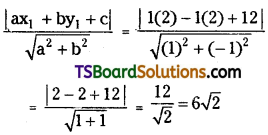
Question 37.
Show that, four common tangents can be drawn for the circles given by x2 + y2 – 14x + 6y + 33 = 0 and x2 + y2 + 30x – 2y + 1 = 0 and find the internal and external centres of similitude. [(TS) Mar. ’19]
Solution:
Given equations of the circles are
x2 + y2 – 14x + 6y + 33 = 0 ……..(1)
x2 + y2 + 30x – 2y + 1 = 0 ………(2)
For the circle (1), Centre C1 = (7, -3)
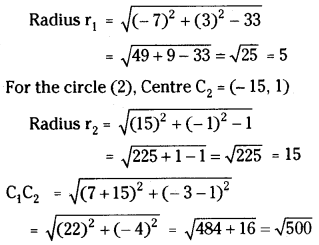
Now r1 + r2 = 5 + 15 = 20 = √400
∴ C1C2 > r1 + r2
∴ The given circles are each circle lies completely outside the other circle.
∴ No.of common tangents = 4
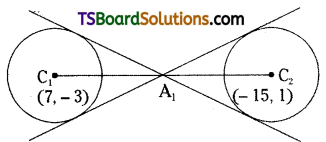
The internal centre of similitude A1 internally divides C1C2 in the ratio r1 : r2 (5 : 15 = 1 : 3).
∴ The internal centre of similitude
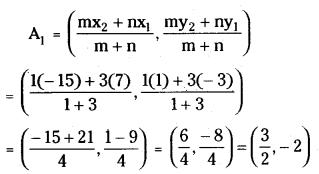
The external centre of similitude A2 divides C1C2 in the ratio r1 : r2 (5 : 15 = 1 : 3) externally.
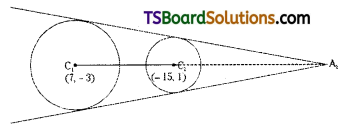
∴ The external centre of similitude
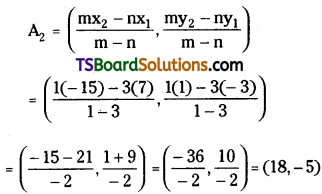
Question 38.
If a point P is moving such that the lengths of the tangent drawn from ‘P’ to the circle x2 + y2 + 8x + 12y + 15 = 0 and x2 + y2 – 4x – 6y – 12 = 0 are equal, then find the equation of the locus of P. (Mar. ’09)
Solution:
Given equations of the circles are
x2 + y2 + 8x + 12y + 15 = 0
x2 + y2 – 4x – 6y – 12 = 0
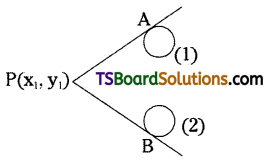
Let P(x1, y1) be any point on the locus.
PA, PB be the lengths of the tangent from P to the circles (1) & (2) respectively.
Given condition is PA = PB
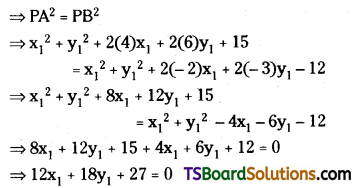
The equation of the locus of ‘P’ is 12x + 18y + 27 = 0
⇒ 4x + 6y + 9 = 0
![]()
Question 39.
Find the inverse point of (-2, 3) with respect to the circle x2 + y2 – 4x – 6y + 9 = 0.
Solution:
Given equation of the circle is x2 + y2 – 4x – 6y + 9 = 0
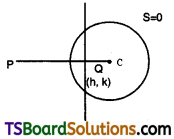
Comparing this equation with x2 + y2 + 2gx + 2fy + c = 0
we get, g = -2, f = -3, c = 9
Let, the given point P(x1, y1) = (-2, 3)
Now, the polar of P(-2, 3) w.r.t. the given circle is S1 = 0.
xx1 + yy1 + g(x + x1) + f(y + y1) + c = 0
⇒ x(-2) + y(3) – 2(x – 2) – 3(y + 3) + 9 = 0
⇒ -2x + 3y – 2x + 4 – 3y – 9 + 9 = 0
⇒ -4x + 4 = 0
⇒ x – 1 = 0
Let Q(h, k) be the inverse point of P(-2, 3) w.r.t. the circle x2 + y2 – 4x – 6y + 9 = 0.
Now, Q(h, k) is the foot of the perpendicular from P(-2, 3) w.r.t. x – 1 = 0
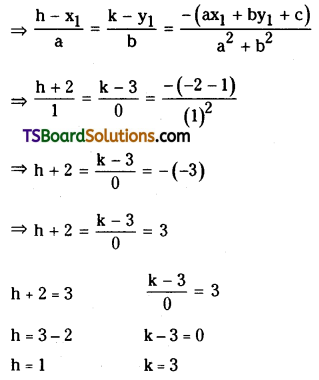
∴ The inverse point of (-2, 3) is (1, 3).